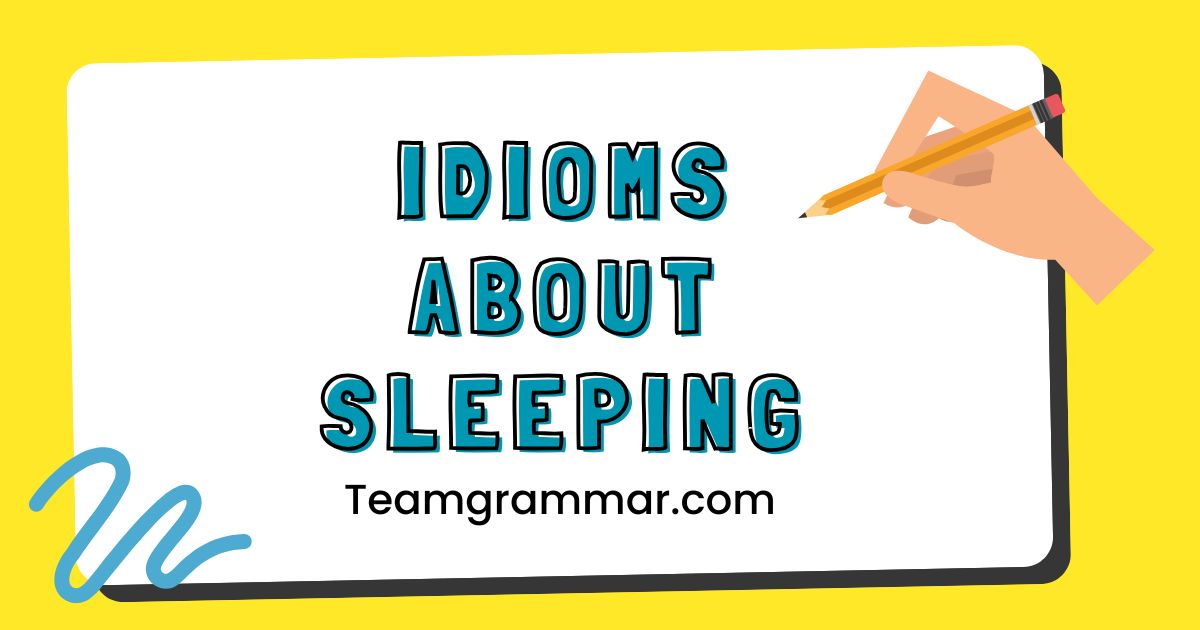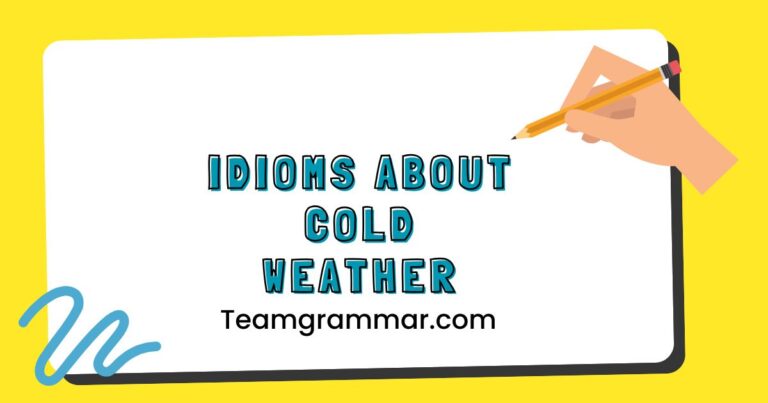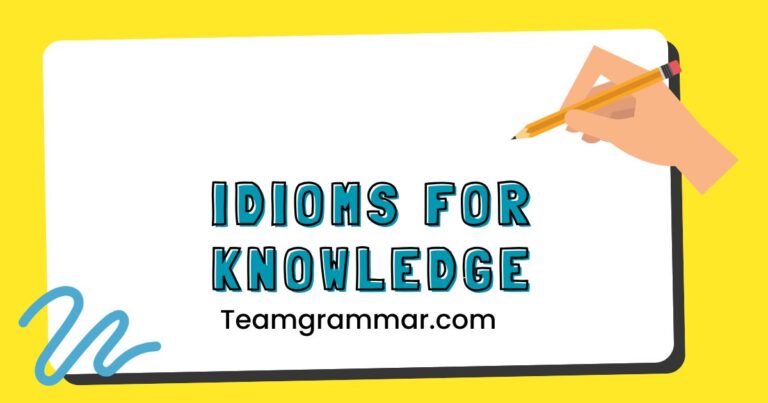29 Sleeping Idioms: Mastering Common English Expressions
Idioms add color and depth to the English language, making conversations and writing more engaging and expressive. Understanding idioms, especially those related to sleep, is crucial for both comprehending and using English effectively.
Sleep-related idioms are particularly common in everyday speech and literature. They often convey nuances about a person’s state of mind, energy levels, or general well-being.
This article will delve into the world of sleeping idioms, providing definitions, examples, and practical exercises to help you master these essential expressions. Whether you’re an ESL learner or a native speaker looking to refine your language skills, this comprehensive guide will enhance your understanding and usage of English idioms.
This article is designed to be a comprehensive resource for anyone interested in learning about and mastering idioms related to sleep. It provides clear definitions, numerous examples, and practical exercises to help you understand and use these idioms effectively.
By the end of this article, you’ll be able to confidently recognize and use sleep-related idioms in your everyday conversations and writing.
Table of Contents
- Definition of Idioms About Sleeping
- Structural Breakdown of Sleeping Idioms
- Types and Categories of Sleeping Idioms
- Examples of Sleeping Idioms
- Usage Rules for Sleeping Idioms
- Common Mistakes with Sleeping Idioms
- Practice Exercises
- Advanced Topics in Sleeping Idioms
- Frequently Asked Questions
- Conclusion
Definition of Idioms About Sleeping
An idiom is a phrase or expression whose meaning cannot be understood from the literal meanings of its individual words. Instead, an idiom has a figurative meaning that is known through common usage.
Idioms about sleeping are expressions that use the concept of sleep to convey a different meaning, often related to energy, awareness, or ease. These idioms are a colorful part of the English language and add depth to communication.
These idioms are often metaphorical and can be used to describe a variety of situations and feelings. For example, someone who is described as “sleeping like a log” is not literally sleeping in the shape of a log, but rather sleeping very soundly.
Similarly, “to hit the hay” doesn’t involve any physical striking of hay; it simply means to go to bed.
Understanding idioms requires familiarity with their cultural context and common usage. While the individual words might be simple, the combined meaning is often abstract and requires learning.
Mastering idioms can significantly improve your comprehension and fluency in English.
Structural Breakdown of Sleeping Idioms
Sleeping idioms, like all idioms, don’t follow standard grammatical rules when it comes to interpreting their meaning. Their structure is often fixed, meaning you can’t change the words or word order without altering or losing the idiom’s intended meaning.
They can appear as phrases, clauses, or even complete sentences.
The structural elements typically involve a verb related to sleep (e.g., sleep, doze, nap) or nouns associated with sleep (e.g., bed, dream, pillow). These words are then combined with other words to create a figurative meaning.
For example, in the idiom “sleep on it,” the verb “sleep” is combined with the preposition “on” and the pronoun “it” to mean “to think about something before making a decision.”
The key to understanding the structure of idioms is to recognize that their meaning is not compositional. You can’t break down the idiom into its individual word meanings and add them together to get the overall meaning.
Instead, you must learn the idiom as a single unit of meaning.
Types and Categories of Sleeping Idioms
Sleeping idioms can be categorized based on the specific aspect of sleep they relate to. This classification helps in understanding the nuances and contexts in which each idiom is used.
Here are some common categories:
Idioms About Energy Levels
These idioms describe how energetic or tired someone is. They often use sleep as a metaphor for rest and rejuvenation.
Idioms About Unconsciousness
These idioms refer to the state of being asleep or unaware of what’s happening around you.
Idioms About Ease of Sleeping
These idioms describe how easily or soundly someone sleeps.
Idioms About Sleeplessness
These idioms describe the state of not being able to sleep.
Idioms About Resting
These idioms refer to taking a break or relaxing, often implying a short period of sleep or rest.
Examples of Sleeping Idioms
Understanding idioms requires seeing them in context. The following tables provide examples of sleeping idioms, categorized by their meaning.
Each example includes the idiom, its meaning, and a sentence demonstrating its use.
Idioms About Energy Levels
This table illustrates idioms related to energy levels, showcasing how sleep-related expressions can convey states of fatigue or vitality.
| Idiom | Meaning | Example Sentence |
|---|---|---|
| Sleepyhead | Someone who is always tired or loves to sleep | My brother is such a sleepyhead; he can sleep through anything. |
| Full of pep | Energetic and lively | After a good night’s sleep, she was full of pep and ready to start the day. |
| Recharge one’s batteries | To rest and regain energy | I need to recharge my batteries this weekend after a long week at work. |
| Burn the candle at both ends | To work or do too much, leading to exhaustion | He’s been burning the candle at both ends trying to finish the project on time. |
| Running on fumes | To continue operating despite being exhausted | I’m running on fumes today after only getting a few hours of sleep. |
| Hit the hay | Go to bed | It’s getting late; I’m going to hit the hay. |
| Call it a night | To stop working or doing something for the rest of the evening | We’ve been working hard all day; let’s call it a night. |
| Out like a light | To fall asleep very quickly and deeply | As soon as his head hit the pillow, he was out like a light. |
| Sleep like a log | To sleep very soundly | I slept like a log last night and feel completely refreshed. |
| Catch some Z’s | To sleep | I’m going to catch some Z’s before the movie starts. |
| Sawing logs | Snoring loudly | My roommate was sawing logs all night, so I didn’t get much sleep. |
| Five more minutes | Requesting a short extension of sleep time | “Five more minutes,” she mumbled, burying her face in the pillow. |
| Sleep in | To allow oneself to sleep later than usual | I plan to sleep in on Sunday morning to catch up on rest. |
| Rise and shine | A phrase used to wake someone up, often cheerfully | Rise and shine, everyone! It’s time to start the day! |
| Early bird | Someone who wakes up early and is productive in the morning | She’s an early bird who gets all her work done before noon. |
| Night owl | Someone who stays up late and is active at night | He’s a night owl and prefers to work late into the night. |
| Burn the midnight oil | To work late into the night | The students were burning the midnight oil to prepare for their exams. |
| Power nap | A short sleep taken during the day to quickly regain energy | I took a power nap to help me focus for the afternoon meetings. |
| Cat nap | A short, light sleep | She took a cat nap on the couch before dinner. |
| Heavy sleeper | Someone who sleeps soundly and is difficult to wake up | He’s such a heavy sleeper that the alarm clock doesn’t even bother him. |
| Light sleeper | Someone who wakes up easily | She’s a light sleeper, so even the slightest noise wakes her up. |
Idioms About Unconsciousness
This table focuses on idioms that describe states of unconsciousness, using sleep as a metaphor for being unaware or unresponsive.
| Idiom | Meaning | Example Sentence |
|---|---|---|
| Asleep at the switch | Not paying attention or being negligent | The security guard was asleep at the switch when the thieves broke in. |
| Nod off | To fall asleep briefly, often unintentionally | I nodded off during the boring lecture. |
| In dreamland | Being asleep and dreaming | The baby is in dreamland, sleeping peacefully. |
| Out cold | Unconscious | After the accident, he was out cold for several minutes. |
| Lost in slumber | Deeply asleep | The village was lost in slumber as the sun began to rise. |
| Dead to the world | Sleeping very deeply and not easily disturbed | He was dead to the world after his marathon. |
| In the land of nod | Sleeping | The children are all in the land of nod. |
| Doze off | To fall asleep lightly | I often doze off while watching TV. |
| Catch a wink | To get a short sleep | I tried to catch a wink on the train. |
| Sleep on it | To think about something before making a decision | Don’t make a decision now; sleep on it and tell me tomorrow. |
| Wake up on the wrong side of the bed | To be in a bad mood from the start of the day | He must have woken up on the wrong side of the bed because he’s been grumpy all morning. |
| Dream up | To invent or imagine something | She dreamed up a new marketing strategy for the company. |
| Sweet dreams | A wish for someone to have pleasant dreams | “Goodnight, sweet dreams,” she whispered to her child. |
| Pipe dream | An unrealistic hope or plan | His plan to become a millionaire overnight is just a pipe dream. |
| Dream come true | Something that you have wanted for a long time that has now happened | Winning the lottery was a dream come true for her. |
| Living the dream | Enjoying a very good and successful life | After years of hard work, he’s finally living the dream. |
| Never in my wildest dreams | Used to emphasize that something is very surprising or unlikely | Never in my wildest dreams did I think I would win an award. |
| Wake-up call | An event that serves as a warning or alert | The company’s declining sales were a wake-up call. |
| Fast asleep | Sleeping deeply | The baby was fast asleep in her crib. |
| Take a nap | To sleep for a short period, typically during the day | I’m going to take a nap before we go out tonight. |
| Bedtime story | A story told to a child before they go to sleep | She read her daughter a bedtime story every night. |
Idioms About Ease of Sleeping
This section provides idioms that describe how easily or soundly someone sleeps, reflecting the quality of rest they experience.
| Idiom | Meaning | Example Sentence |
|---|---|---|
| Sleep like a baby | To sleep very peacefully and soundly | After the long hike, I slept like a baby. |
| Fall asleep at the drop of a hat | To fall asleep very easily and quickly | He can fall asleep at the drop of a hat, no matter where he is. |
| Drift off to sleep | To gradually fall asleep | I drifted off to sleep while reading my book. |
| Be sound asleep | To be sleeping deeply | The children were sound asleep when we got home. |
| Snug as a bug in a rug | Comfortable and cozy, often used to describe someone sleeping soundly | The baby was snug as a bug in a rug in her warm blanket. |
| Nestle down | To settle comfortably into a sleeping position | She nestled down into her pillow and quickly fell asleep. |
| In a deep sleep | Sleeping very soundly | He was in a deep sleep and didn’t hear the thunderstorm. |
| Out for the count | Sleeping so deeply that one is unaware of what is happening around them | After running the marathon, he was out for the count. |
| Off to dreamland | Going to sleep | Time to brush your teeth and then you’re off to dreamland. |
| Lullaby | A soothing song sung to help a child fall asleep | She sang a lullaby to her baby to help her sleep. |
| Pillow talk | Intimate conversation shared in bed | They enjoyed some pillow talk before falling asleep. |
| Turn in | To go to bed | I’m going to turn in early tonight. |
| Hit the sack | To go to bed | I’m exhausted; I’m going to hit the sack. |
| Lights out | Time to go to sleep | It’s lights out in ten minutes! |
| Sack out | To go to sleep | I’m so tired, I just want to sack out on the couch. |
| Under the covers | In bed, ready to sleep | She was already under the covers when I got home. |
| Tuck in | To make someone comfortable in bed by pulling the covers around them | She tucked the children in and kissed them goodnight. |
| Sleep tight | Sleep well | Goodnight, sleep tight, and don’t let the bedbugs bite! |
| Rest one’s head | To sleep or lie down | He needed a place to rest his head for the night. |
| Hibernate | To spend the winter sleeping | Bears hibernate during the winter months. |
Idioms About Sleeplessness
This table presents idioms that describe the state of not being able to sleep, highlighting the challenges of insomnia and restless nights.
| Idiom | Meaning | Example Sentence |
|---|---|---|
| Lose sleep over something | To worry about something so much that you can’t sleep | Don’t lose sleep over such a small problem. |
| Toss and turn | To move around restlessly in bed because you can’t sleep | I was tossing and turning all night, unable to get comfortable. |
| Not sleep a wink | To not sleep at all | I didn’t sleep a wink last night because of the noise. |
| Wide awake | Fully alert and unable to sleep | I’m wide awake even though it’s late. |
| Counting sheep | Trying to fall asleep by imagining and counting sheep | I was counting sheep, but it didn’t help. |
| Stay up all night | To not go to bed | We stayed up all night watching movies. |
| Burning the candle at both ends | Working very hard and not getting enough sleep | She’s been burning the candle at both ends to meet the deadline. |
| Eyes wide open | Fully awake and aware | I went into the situation with my eyes wide open. |
| Lie awake | To stay in bed without sleeping | I often lie awake thinking about my problems. |
| Insomnia | Difficulty falling or staying asleep | He suffers from chronic insomnia. |
| Restless night | A night of disturbed or uneasy sleep | I had a restless night and woke up feeling tired. |
| Sleepless night | A night without sleep | The storm caused me to have a sleepless night. |
| Stay awake | To remain conscious and not fall asleep | I had to stay awake to finish my project. |
| Full of beans | Full of energy and unable to relax or sleep | The children were full of beans and wouldn’t go to bed. |
| Wired | Unable to relax or sleep due to excitement or caffeine | I’m too wired to sleep after drinking all that coffee. |
| On edge | Anxious and unable to relax | I was on edge all night waiting for the phone to ring. |
| Tensed up | Stressed and unable to relax | I was so tensed up that I couldn’t fall asleep. |
| Anxious | Feeling worried, nervous, or uneasy | I was too anxious to fall asleep before the exam. |
| Nervous | Apprehensive and unable to relax | I was too nervous to sleep before the big game. |
Idioms About Resting
This section includes idioms that refer to taking a break or relaxing, often implying a short period of sleep or rest, showcasing how these expressions are used in daily conversations.
| Idiom | Meaning | Example Sentence |
|---|---|---|
| Take a load off | To relax or rest | After a long day, he decided to take a load off and watch TV. |
| Put your feet up | To relax, especially by sitting or lying down with your feet supported | Why don’t you put your feet up and let me get you a drink? |
| Take five | To take a short break | Let’s take five and then get back to work. |
| Take a breather | To pause and relax briefly | I need to take a breather after running up the stairs. |
| Rest and relaxation | A period of time spent relaxing and recovering | The doctor recommended rest and relaxation to recover from the illness. |
| R and R | Rest and recuperation | The soldiers were given some R and R after their tour of duty. |
| Unwind | To relax and reduce stress | I like to unwind by reading a good book. |
| Kick back | To relax and enjoy oneself | We decided to kick back and watch the game. |
| Loosen up | To relax and become less tense | Try to loosen up before giving your speech. |
| Chill out | To relax and calm down | Just chill out and everything will be fine. |
| Take it easy | To relax and avoid stress or exertion | You’ve been working too hard; you need to take it easy. |
| Hang loose | To relax and not worry | Just hang loose and see what happens. |
| Catch your breath | To pause and regain composure or energy | I need to catch my breath after that run. |
| Take a break | To stop working or doing something for a short time | Let’s take a break and get some coffee. |
| Time out | A break from an activity | We need to call time out and regroup. |
| Quiet time | A period of time for relaxation and reflection | I need some quiet time to clear my head. |
| Down time | Time for relaxation and recovery | I use my down time to pursue my hobbies. |
| Leisure time | Free time for relaxation and enjoyment | I spend my leisure time reading and gardening. |
| Take a vacation | To take time off from work for travel and relaxation | We’re planning to take a vacation to the beach. |
| Get some rest | To relax and sleep in order to recover energy | You look tired; you should get some rest. |
| Take it slow | To proceed at a relaxed pace | You’re recovering from surgery, so take it slow. |
Usage Rules for Sleeping Idioms
Using idioms correctly requires understanding their specific meanings and contexts. Here are some general rules to follow:
- Context is Key: Pay attention to the situation and the tone of the conversation. Idioms are often informal and may not be appropriate in formal settings.
- Fixed Structure: Idioms usually have a fixed structure. Avoid changing the words or word order, as this can alter or negate their meaning.
- Cultural Awareness: Idioms are often culturally specific. Make sure you understand the cultural context in which the idiom is used.
- Audience Consideration: Be mindful of your audience. Some people may not be familiar with certain idioms, especially if they are not native English speakers.
- Practice: The best way to learn idioms is through practice. Use them in your own conversations and writing to become more comfortable with them.
It’s also important to note that the literal interpretation of an idiom is usually incorrect. Trying to understand an idiom by analyzing the individual words will often lead to confusion.
Instead, focus on learning the overall meaning of the idiom as a single unit.
For example, if someone tells you to “sleep on it,” they are not literally asking you to sleep on a physical object. They are suggesting that you take some time to think about a decision before making it.
Common Mistakes with Sleeping Idioms
Using idioms incorrectly can lead to misunderstandings. Here are some common mistakes to avoid:
- Literal Interpretation: Interpreting idioms literally instead of understanding their figurative meaning.
- Incorrect Word Order: Changing the order of words in an idiom, which can alter its meaning or make it nonsensical.
- Mixing Idioms: Combining parts of different idioms, resulting in a confusing and incorrect expression.
- Overuse: Using too many idioms in a single conversation, which can make your speech sound unnatural or forced.
- Inappropriate Context: Using idioms in formal situations where they are not appropriate.
Here are some examples of common mistakes and their corrections:
| Incorrect | Correct | Explanation |
|---|---|---|
| I slept as a log. | I slept like a log. | The correct idiom is “sleep like a log,” not “sleep as a log.” |
| He hit the bed. | He hit the hay. | The correct idiom for going to bed is “hit the hay,” not “hit the bed.” |
| She burned the candle from both sides. | She burned the candle at both ends. | The correct idiom is “burn the candle at both ends,” not “from both sides.” |
| Don’t lose your sleep for it. | Don’t lose sleep over it. | The correct idiom is “lose sleep over it,” not “lose your sleep for it.” |
By being aware of these common mistakes, you can avoid using idioms incorrectly and improve your communication skills.
Practice Exercises
Test your understanding of sleeping idioms with these exercises. Choose the correct idiom to complete each sentence.
| Question | Options | Answer |
|---|---|---|
| After a long day at work, I just want to _____. | a) hit the books b) hit the hay c) hit the road | b) hit the hay |
| He was so tired that he ____ during the movie. | a) nodded off b) woke up c) stayed up | a) nodded off |
| She _____ over the upcoming presentation. | a) slept soundly b) lost sleep c) slept in | b) lost sleep |
| The baby _____ all night. | a) slept like a log b) stayed awake c) burned the candle | a) slept like a log |
| I need to _____ after this busy week. | a) burn the oil b) recharge my batteries c) stay wired | b) recharge my batteries |
| He is a _____, always going to bed late. | a) early bird b) night owl c) sleepyhead | b) night owl |
| She told him to _____ before making a decision. | a) sleep under it b) sleep on it c) sleep beside it | b) sleep on it |
| After the marathon, he was _____. | a) out like a light b) full of pep c) running on fumes | a) out like a light |
| They decided to _____ and go home. | a) call it a day b) call it a night c) call it a life | b) call it a night |
| I’m going to _____ on Sunday morning. | a) rise and shine b) sleep in c) burn out | b) sleep in |
Answer Key: 1. b, 2. a, 3. b, 4. a, 5. b, 6. b, 7. b, 8. a, 9. b, 10. b
Exercise 2: Fill in the blanks with the correct idiom.
| Question | Answer |
|---|---|
| I didn’t _____ last night because of the neighbor’s party. | sleep a wink |
| She is such a _____; she can sleep anywhere. | sleepyhead |
| After the long trip, all I wanted to do was _____. | hit the hay |
| He was _____ during the meeting and missed important information. | asleep at the switch |
| I need to _____ this weekend to prepare for the upcoming week. | recharge my batteries |
| She is a _____ and gets up early to exercise. | early bird |
| He was _____ all night because he was worried about his exam. | tossing and turning |
| They _____ while watching TV. | dozed off |
| He’s been _____ trying to finish the project. | burning the candle at both ends |
| Goodnight, _____! | sleep tight |
Advanced Topics in Sleeping Idioms
For advanced learners, exploring the origins and evolution of sleeping idioms can provide a deeper understanding of their usage. Many idioms have historical roots and reflect cultural attitudes towards sleep.
Researching the etymology of these expressions can reveal fascinating insights into the English language.
Another advanced topic is the use of sleeping idioms in literature and media. Analyzing how authors and screenwriters use these idioms to create vivid imagery and convey complex emotions can enhance your appreciation of English literature and film.
Pay attention to the context in which these idioms are used and how they contribute to the overall meaning of the work.
Furthermore, studying regional variations in the use of sleeping idioms can broaden your understanding of the English language. Different regions may have their own unique idioms related to sleep, reflecting local customs and traditions.
Exploring these variations can help you become a more versatile and culturally sensitive communicator.
Frequently Asked Questions
- What is the difference between an idiom and a literal expression?
An idiom is a phrase whose meaning is different from the literal meanings of its individual words. A literal expression means exactly what it says, with no hidden or figurative meaning. For example, “hit the hay” is an idiom meaning “go to bed,” while “I hit the hay bale” is a literal statement.
- Why is it important to learn idioms?
Learning idioms is important because they are commonly used in everyday conversation and writing. Understanding idioms can improve your comprehension and
fluency in English, allowing you to communicate more effectively and understand native speakers better.
- How can I improve my understanding of idioms?
To improve your understanding of idioms, read widely, listen to native speakers, and pay attention to the context in which idioms are used. Practice using idioms in your own conversations and writing to become more comfortable with them. You can also use online resources and language learning apps to study idioms.
- Are idioms the same in all English-speaking countries?
No, idioms can vary between different English-speaking countries and regions. Some idioms are specific to certain cultures or dialects. It’s important to be aware of these regional variations to avoid misunderstandings.
- Can I create my own idioms?
While it’s possible to create new expressions, they are not considered idioms until they are widely adopted and understood by a community of speakers. Idioms typically evolve over time through common usage.
Conclusion
Mastering idioms about sleeping is a valuable step in enhancing your English language skills. These expressions add color, depth, and nuance to your communication, allowing you to express yourself more effectively and understand others more fully.
By understanding the definitions, usage rules, and common mistakes associated with sleeping idioms, you can confidently incorporate them into your everyday conversations and writing.
Continue to practice and explore new idioms to expand your vocabulary and improve your fluency. The more you immerse yourself in the English language, the more natural and intuitive these expressions will become.
Embrace the challenge of learning idioms, and you’ll find that your communication skills will reach new heights.







